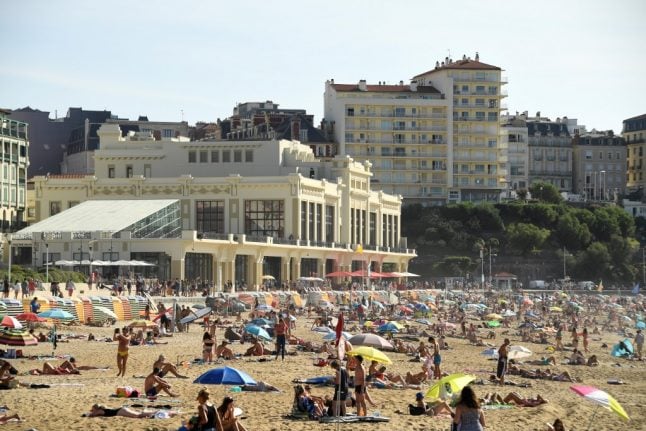What is the travel situation?
After the near total ban on travelling during the lockdown, travel rules have been loosened – but only for some.
The majority of EU countries now now have no travel restrictions so you can travel freely around most of Europe.
However for the rest of the world it's a different story and there are just 12 countries on the EU's 'safe country' list which allow travel for tourism purposes.
Meanwhile the UK has recently imposed a quarantine for anyone travelling from France, which has put a damper on the holiday plans of many from the UK.

The marina at Saint Tropez has seen a high level of bookings. Photo: AFP
So the French resorts are pretty empty then?
Not at all. Many people looking to book a last-minute break have found reservations very difficult to secure and tourist businesses in some resorts say they are as busy if not busier than normal.
Jean-Francois Tourret, head of the Saint-Tropez marina, said that his port was even busier than last year but the trends were very different with more French boats and no super yachts from Russia or the Gulf docking.
“We are doing better than last summer, our port is almost full every evening, however we have fewer yachts and more boats under 40 metres,” he said.
Campsites and rural venues are also benefiting from the desire to be away from crowds, although campers in Brittany had a rude awakening over the weekend when storms hit the region and several sites had to be evacuated.
Who are the clientele?
The majority of the tourists are French, but there has also been in increase in visitors from Switzerland, Germany and the Netherlands this year.
In the small town of L'Isle-sur-la-Sorgue, near Avignon, tourists throng the narrow streets renowned for their antiques shops.
In her shop specialising in truffles, Michelle Colomina enjoyed a 40 percent increase in sales thanks largely to Germans, Dutch and Swiss with French tourists now providing a boost in August.
The tradition of an August summer holiday is strongly ingrained in France and even in a normal year around 70 percent of French people take their holiday in France, leaving the cities and heading to the coast, the countryside or the mountains.
This year the uncertain international situation has seen that rise to around 85 percent, leading to an increase of French bookings in holiday resorts.
“In summer, we normally have 85 percent international visitors and 15 percent French visitors. This year, 60 percent of the visitors are French,” Claude Maniscalco, the head of the Saint-Tropez tourist office told AFP.
Nervousness over flying and public transport means that driving holidays are seeing a surge in popularity, and France makes a good driving destination for holidaymakers from Switzerland, Germany, Belgium and the Netherlands.
So there's no problem for the French tourist businesses?
That's overstating it, the lockdown hit tourist businesses very hard and the situation still being uncertain this summer is not helping.
In total around 10 percent of the French economy is reliant on tourism, and of that 30 percent of made up of international tourism. The increase in French staycationers is not enough to offset those losses.
And there's another problem too – the French apparently spend less while on holiday.
Georges Giraud, a local official in Saint-Tropez, said: “We have a wealthy French and European clientele, who stay in high-end establishments. But they do not spend lavishly like our Russian or American visitors.”

The cancellation of its popular festival has made this a terrible year for Avignon. Photo: AFP
Is everywhere full?
No, those places that are heavily dependent on festivals or events have seen their bookings nosedive as all events of more than 5,000 people are still banned.
The southern French city of Avignon was dealt a hammer blow with the cancellation of its world famous annual theatre festival, which usually runs for several weeks in the summer.
“We had just 20 percent of hotel rooms filled in July whereas normally everything is fully booked up one year in advance,” said Grazia Scarcelli of the Hotel du Palais.
The season has been a disaster for restaurants in Avignon.
“In streets usually thronged with festivalgoers, there has been an 80 percent fall in custom,” said Patrice Mounier, head of the regional hospitality sector association.
River cruises have largely been axed and the number of visitors at the gothic Palais des Papes world heritage site has plummeted to 2,500 daily compared to a peak of 6,000 in August 2019.
It is the same story in neighbouring Arles where the annual photography festival – which normally brings in tens of thousands of visitors – has been slashed.
Businesses that had particularly targeted British or American visitors have also suffered with a lack of clientele.
Will the tourists keep coming?
Rising numbers of coronavirus cases in France have lead to some extra local health restrictions being put in place, while there is the possibility of local lockdowns if some areas see big surges in cases.
Many places have already brought in rules making masks compulsory in the street.
MAP Where in France is it compulsory to wear a mask outdoors?
“Having to wear a mask in this heat is going to make tourists cancel,” fretted Chloe Coulomb, who runs a high-end leather goods shop in Cannes.
At the nearby Trois-Palmiers hotel, the receptionist says she has taken a dozen cancellations since the mask measure was announced.
“It's a shame, the hotel was full every night, it needed to stay that way,” she said.



 Please whitelist us to continue reading.
Please whitelist us to continue reading.
Member comments